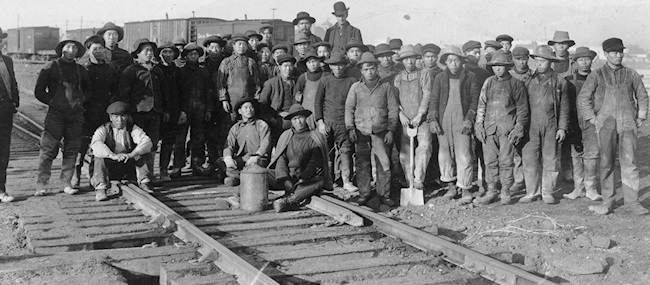
(H/T Angry Asian Man)
Last Thursday, British Columbia premier Christy Clark introduced a bill to the provincial parliament offering an apology for the province’s contribution to more than a century of historic legislation enacted against the province’s Chinese Canadian community. (For Americans: the premier of a province is the political leader of that province, somewhat equivalent to American governors; one of the main differences is that they hold a seat in the province’s Legislative Assembly and are usually the leader of the political party that holds the majority of seats therein.)
While Americans are familiar with the history of federal and state-level laws that were passed in this country targeting Chinese American immigrants, they may be less aware that most of those same laws and ordinances have Canadian counterparts.

Throughout the later half of the 19th century, thousands of Chinese labourers entered Canada, becoming a large source of cheap labour in Canada’s western workforce. They worked in agriculture, mining, and other manual jobs for several decades.
As with America’s Transcontinental Railroad, Chinese labourers were also instrumental in the completion of western lines that contributed to the completion of Canada’s Canadian Pacific Railway in 1885, linking the east and west coasts of the country. Between 1881-1885, 5000 Cantonese workers were sent from Guangdong province as “guest workers” to help complete the CP Railroad (and an additional 7000 were recruited from California); these workers were given the most dangerous tasks of blasting away rocks to make way for the lines. One website reports that within 4 years, only 1/3rd of Canadian railroad workers from Guangdong remained.
Upon completion of the railroad, the Canadian federal government almost immediately enacted a punitive head tax against newly arrived Chinese immigrants — $50 per person — which effectively barred additional entry. That fee was raised to $500 by 1903, which translates to over $10,000 per person in today’s Canadian dollars.
Although the head tax was already prohibitive, in 1923 Canada emphasized their exclusion of Chinese immigrants by passing their own Chinese Exclusion Law which further blocked Chinese immigration. That law was not lifted until 1947, and in 1967 Canada passed its first national immigration law giving Chinese immigrants equal opportunity to enter the country.
Through the first half of the 20th century, Chinese Canadians and other Asian Canadians endured many of the same segregationist laws that Americans are familiar with in the history of this country. Asian Canadians were barred from voting in British Columbia and Saskatchewan (a ban that was passed in B.C. in 1872, and which was repealed in 1949), and segregated into Chinese-only schools. In British Columbia, Chinese Canadian workers were also banned from work in public-works projects, such as road-building. During World War II, Chinese Canadians were discouraged from enlisting in Canadian war efforts, and were only accepted after Canada began fighting in the Pacific Theatre.
It was only after World War II, and the dedicated work of Chinese Canadians to fight for their political rights in the subsequent decades, that helped to repeal anti-Chinese laws and promote Chinese Canadian suffrage. In 2006, their efforts helped to secure a formal apology for Chinese exclusion from Canadian Prime Minister Stephen Harper, along with a compensatory payment of $20,000 to Canada’s 400 surviving immigrants and widows who toiled under those laws.
Last Thursday, British Columbia’s legislature passed a provincial apology for their part in Chinese exclusion, citing their acceptance of federal head tax money, along with their passage of Chinese voter bans and other province-wide measures. The apology comes with no money for survivors, but does include a commitment to place $1 million dollars into a legacy fund for education initiatives.
Here is the full text of the motion:
“Be it resolved that this Legislature apologizes for more than a hundred laws, regulations, and policies that were imposed by past provincial governments that discriminated against people of Chinese descent since 1871, when British Columbia joined Confederation, to 1947.
“These laws and policies denied British Columbia’s Chinese communities’ basic human rights, including but not limited to, the right to vote, hold public office, or own property; imposed labour, educational and employment restrictions; subjected them to health and housing segregation, and prevented them from fully participating in society.
“The House deeply regrets that these Canadians were discriminated against simply because they were of Chinese descent. All members of this House acknowledge that we all aspire to be a fair and just society where people of all nations and cultures are welcomed, accepted and respected.
“Be it further resolved that the House acknowledge that the Chinese Canadian Community endured untold hardships and persevered with grace and dignity.
“We acknowledge that despite being subjected to discriminatory laws, policies and practices, the Chinese community has made, and continues to make, substantial contributions to the culture, history and economic prosperity in our province.”
It’s important that we not forget our history, and that we acknowledge the racism of our past. While this formal apology cannot even begin to fully make up for nearly 80 years of anti-Asian racism on the part of Canada’s federal and provincial governments, it is a good first step.

